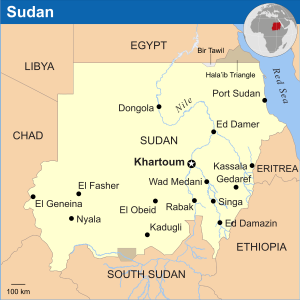
JUBA, South Sudan (Morning Star News) – Sudanese security personnel in North Khartoum last week jailed 14 Christians after raiding an evangelical school on a church property the government is helping a Muslim business interest to seize, sources said.
Leaders of the Khartoum Bahri Evangelical Church were inside the Evangelical School of Khartoum North trying to stop authorities from taking parts of the building at the time of the raid on July 7, they said. One source said police insulted the Christians and used force to arrest them. They were detained until Sunday (July 10) and released after paying fines.
Prior to their arrest, police detained 11 Christians at the school that morning but quickly released them. Of the 14 Christians arrested later that day and released on Sunday (July 10), 13 paid fines of 300 Sudanese pounds (about $US50), while one paid a fine of 500 Sudanese pounds ($US80) after a court found them guilty of public disorder and opposing police personnel under Public Order law article 77/169.
Khartoum Bahri Evangelical Church, of the Sudan Presbyterian Evangelical Church (SPEC), has been the subject of government harassment, arrests and demolition of part of its worship center as Muslim investors have tried to take it over. Authorities charged two South Sudanese pastors, Peter Yein Reith and Yat Michael, with crimes calling for the death penalty due to their efforts to defend the church against the illegal sale of its property to the Muslim business interest. They were released following eight months in prison.
Michael, 49, was arrested in December 2014 after encouraging the church. Reith, 36, was arrested on Jan. 11, 2015 after submitting a letter from South Sudan Presbyterian Evangelical Church leaders inquiring about the whereabouts of Michael.
Christians called for prayers for the church leaders and other Christians arrested last week.
“Pray for them, because they are being persecuted because of Christ,” said one former church leader who fled the country due to persecution in 2011.
Police aboard five vehicles raided the compound of the evangelical school, which is owned by the SPEC.
Last year a court ruled that committees imposed on the church to enable Muslim investors to take it over were illegal.
Harassment, arrests and persecution of Christians have intensified since the secession of South Sudan in July 2011. The Sudanese Minister of Guidance and Endowments announced in April 2013 that no new licenses would be granted for building new churches in Sudan, citing a decrease in the South Sudanese population.
Sudan since 2012 has expelled foreign Christians and bulldozed church buildings on the pretext that they belonged to South Sudanese. Sudan fought a civil war with the South Sudanese from 1983 to 2005, and in June 2011, shortly before the secession of South Sudan the following month, the government began fighting a rebel group in the Nuba Mountains that has its roots in South Sudan.
Due to its treatment of Christians and other human rights violations, Sudan has been designated a Country of Particular Concern by the U.S. State Department since 1999, and the U.S. Commission on International Religious Freedom recommended the country remain on the list in its 2016 report.
Sudan ranked eighth on Christian support organization Open Doors’ 2016 World Watch List of countries where Christians face most persecution.
A special message from the publisher…
 Dear Reader, our hearts are deeply grieved by the ongoing devastation in Iraq, and through this we have been compelled to take a stand at the gates of hell against the enemy who came to kill and destroy. Bibles for Iraq is a project to put Arabic and Kurdish audio Bibles into the hands of Iraqi and Syrian refugees—many of whom are illiterate and who have never heard the gospel.Will you stand with us and make a donation today to this important effort? Please click here to send a Bible to a refugee >>
Dear Reader, our hearts are deeply grieved by the ongoing devastation in Iraq, and through this we have been compelled to take a stand at the gates of hell against the enemy who came to kill and destroy. Bibles for Iraq is a project to put Arabic and Kurdish audio Bibles into the hands of Iraqi and Syrian refugees—many of whom are illiterate and who have never heard the gospel.Will you stand with us and make a donation today to this important effort? Please click here to send a Bible to a refugee >>



